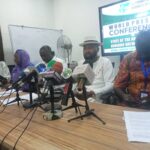Proposed National WASH policy to reflect MHM concerns- WaterAid
By Tosin Kolade
WaterAid Nigeria has announced that the National Water, Sanitation and Hygiene (WASH) policy will address all Menstrual Hygiene Management (MHM) concerns in the country.
The organisation said this would be done through partnership with the Federal Government, key line Ministries, Departments and Agencies (MDAs), development partners and the media.
This was the thrust at the 2024 Global Menstrual Health and Hygiene day celebration with the theme, “Together for a Period Friendly World”, which held at the Government Secondary School, Zuba, FCT.
The event was is in partnership with the FCT Rural Water Supply and Sanitation Agency (RUWASSA).
WaterAid Nigeria’s Country Director, Evelyn Mere, said the WASH policy is aimed at addressing WASH issues including safely managed sanitation, institutional arrangement, sanitation in the rural, peri-urban and urban settings.
This, she noted was in line with the African Sanitation Policy Guidelines (ASPG).
Mere said the goal would be achieved through policies, programmes, and related budgets for people to get the needed support.
According to her, the goal is to also ensure that public and school toilets cater to the needs of young girls, women, and persons with disabilities.
Mere, represented by Ms. Idowu Adebayo, WaterAid WASH Manager, said the day also coincided with a decade of efforts to bring menstrual health to the forefront and enable women and girls reach their full potential.
 She highlighted the ongoing challenges faced by women and girls in accessing menstrual products, facilities, and education due to societal constraints and discriminatory norms.
She highlighted the ongoing challenges faced by women and girls in accessing menstrual products, facilities, and education due to societal constraints and discriminatory norms.
Mere said the barriers contributed to unhygienic practices, misconceptions, and negative attitudes, often resulting in shaming, bullying, and gender-based violence.
Citing data from the 2021 WASHNORM report, the country director underscored the dire situation in communities lacking proper water, sanitation, and hygiene facilities.
“The report revealed that 94 per cent of healthcare facilities, 89 per cent of schools and 96 per cent of markets and motor parks lacked basic water, sanitation and hygiene services.
“This exacerbates the challenges faced by marginalised communities and young women, leading to their exclusion from public spaces and schools during menstruation.
“WaterAid, in partnership with organisations like Cummins, has committed to addressing these issues by providing clean water, sanitation facilities, and raising awareness about menstrual health,’’ she said.
Mere said that the theme was a collaborative approach to combat the stigma surrounding menstruation and ensure universal access to essential products, education, and infrastructure is more urgent than ever.
Mrs Aisha Bakpet, HOD Sanitation, FCT RUWASSA, emphasised the importance of stakeholders uniting to promote menstrual hygiene in schools and communities.
According to her, FCT RUWASSA, in collaboration with WaterAid, is building female-friendly toilets in schools, aiming to destigmatise menstrual hygiene.
Bakpet said the agency had constructed one of such toilet, featuring amenities like mirrors and menstrual pads, saying that plan to replicate the design in other schools they support was ongoing.
She added that the agency was funding hygiene promotion activities to foster a hygienic environment.
Representative of Cummins West Africa, Mrs Alice Akinbode, said the organisation valued the support of women and their children, and acknowledging the vital importance of menstrual hygiene for health and well-being.
She said that menstrual hygiene awareness was important for everyone, regardless of gender.
Akinbode stressed the importance of menstrual hygiene for current and future health, noting that supporting and educating each other createed a healthier environment for everyone.
 A representative from the Federal Ministry of Water Resources and Sanitation, Mrs Abasiama Ebreso, educated the school children on the connection between menstrual health hygiene and WASH, emphasising its prioritisation.
A representative from the Federal Ministry of Water Resources and Sanitation, Mrs Abasiama Ebreso, educated the school children on the connection between menstrual health hygiene and WASH, emphasising its prioritisation.
According to her, access to WASH is a human rights issue, and its importance cannot be overstated, calling for hygiene promotion at all times.
The Vice Principal Administration of the school, Mr Usman Hayatudeen, commended the dedication to addressing menstrual health challenges and encouraging open discussions that advanced progress and dignity within the communities.
He spoke on the importance of initiatives like installing hand-washing stations in classroom corridors, toilet entrances and administration blocks, which not only aligned with environmental standards, but also elevated hygiene practices throughout the school.
“Nevertheless, we acknowledge the pressing need for additional restroom facilities to accommodate the expanding school population, as well as the critical requirement for a consistent water supply to support sanitation and drinking needs,” he said.
The News Agency of Nigeria (NAN) reports that World Menstrual Hygiene Day 2024 is a global initiative aimed at raising awareness and promoting good menstrual hygiene practices for women and girls around the world.
It is observed on May 28 every year as a reminder of the challenges faced by women and girls in managing their periods; particularly in low-income countries where access to clean water, sanitation, and hygienic products is limited. (NAN)(www.nannews.ng)
Edited by Chijioke Okoronkwo
Published By
- Agriculture and Environment Desk Controller/Website Content Manager.
Has also recently published
 General NewsJuly 5, 2025Natasha’s reinstatement: NCSCN condemns call for protest, urges restraint
General NewsJuly 5, 2025Natasha’s reinstatement: NCSCN condemns call for protest, urges restraint EnvironmentJuly 4, 2025Group empowers young Nigerians for climate advocacy
EnvironmentJuly 4, 2025Group empowers young Nigerians for climate advocacy Economy/BusinessJuly 4, 2025Rebranding initiative to boost development, transparency – BPP
Economy/BusinessJuly 4, 2025Rebranding initiative to boost development, transparency – BPP General NewsJuly 4, 2025VON targets 500m Swahili listeners through partnership with Tanzania
General NewsJuly 4, 2025VON targets 500m Swahili listeners through partnership with Tanzania





